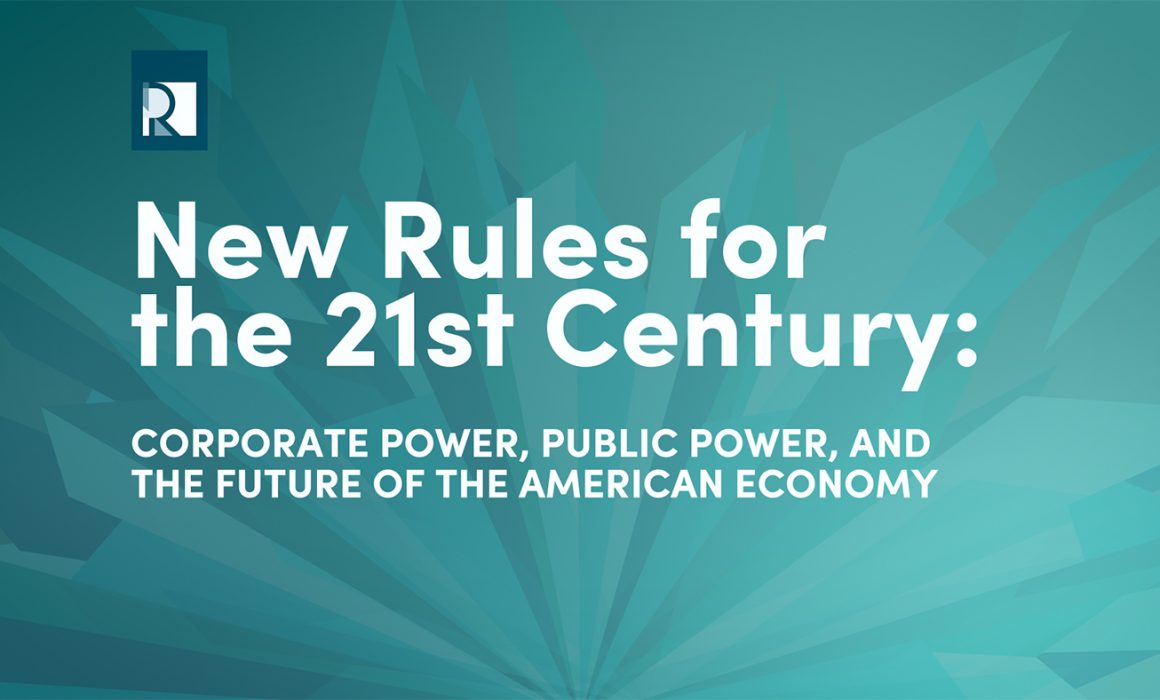New Rules for the 21st Century: Corporate Power, Public Power, and the Future of the American Economy
April 10, 2019
By Nell Abernathy, Darrick Hamilton, Julie Margetta Morgan
America’s political landscape and economic thinking are shifting. The 2016 election—and the rise of powerful movements over the past decade—has shown us that Americans are calling for change. They want a diagnosis of our economy to help make sense of what’s gone wrong and to suggest ways to make things better. In New Rules for the 21st Century: Corporate Power, Public Power, and the Future of the American Economy, Nell Abernathy, Darrick Hamilton, and Julie Margetta Morgan argue that the future of the American economy and our democracy depend on a new way of thinking about markets and a new way of thinking about the role of government. With a renewed commitment to transforming corporations, restructuring markets, reviving democratic institutions, and reimagining the role of government, we can respond to our current political moment. Ultimately, we want to restructure our economy to make both the private and public sectors better serve more Americans.
The report includes a foreword by Roosevelt Chief Economist Joseph E. Stiglitz. “In many ways, abuses of growing corporate power—both in the public and private sphere—and the diminution of public power are at the core of our current predicament,” he says.
Despite more work hours and headline economic growth, wages are persistently low. Wealth inequality threatens our shared economic prosperity and our democracy. The basic building blocks of a safe and secure life, such as quality education and accessible health care, are increasingly out of reach. Climate change is destroying the health of our planet, and it’s set to imperil the economy—and our lives. Progress made toward economic inclusion in the wake of the civil rights and women’s rights era has been held back, while overt racism is gaining momentum in our public discourse. Our democracy is in peril like never before. The challenges we face may seem disparate, but they share common roots: The problem is an approach to policymaking based on the flawed belief that markets are the only efficient way to achieve public goals. This has dominated our politics and policymaking for the past 50 years.
The Roosevelt Institute is offering a progressive one-two punch: We must curb corporate power and reimagine public power, which means reimagining the role of government. We can do this by:
- Rethinking the contemporary markets-first approach in favor of a more pragmatic assessment: when and how to deploy the power of government to directly provide goods and services and tackle the challenges our nation faces;
- Restructuring the economy by writing new rules that strike at the heart of today’s concentrations of wealth and power; and
- Reforming our political institutions, so that we can make both the private sector and the government work for all of us again.
Over the last four years, this structural argument about remaking American institutions in the public good has been ascendant, but it is far from victorious. Reining in extractive corporate power. Deploying government power in new and expansive ways. Both are needed to build an inclusive economy and meet our country’s pressing needs. Progressives who are willing to punch back at 50 years of distorted policy choices have empirics, morality, and the American people on their side.
Read the report summary
click here Opens in new windowLearn more about New Rules for the 21st Century
click here Opens in new window